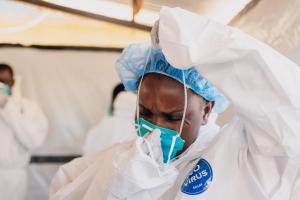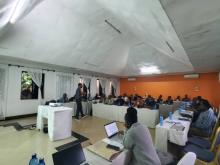Tanzania strengthens healthcare associated infection surveillance to prevent future outbreak
Kagera Region – Tanzania is stepping up efforts to strengthen healthcare-associated infection (HAI) surveillance following a recent Marburg virus outbreak in the Kagera Region, which claimed two lives earlier this year.
With funding from the UK’s Foreign, Commonwealth & Development Office (FCDO), the World Health Organization (WHO), in collaboration with the Ministry of Health, conducted a four-day training for 41 healthcare workers in Kagera. The initiative focused on improving the detection, prevention, and management of HAIs.
This initiative forms part of a broader national strategy to boost health system resilience and outbreak preparedness. It builds on earlier efforts, including the development and distribution of a national HAI surveillance protocol to all 26 public referral hospitals. Implementation is now expanding to lower-level and private health facilities. To date, five regions — Kigoma, Mtwara, Lindi, Dar es Salaam, and Kagera — have begun integrating HAI surveillance at the primary healthcare level.
The training included capacity building in infection prevention and control (IPC), with participants receiving practical tools, standardized procedures, and training in data analysis to strengthen surveillance quality and timely reporting.
“The training was an invaluable opportunity for us to enhance our preparedness and response capability to disease outbreaks,” said Dr. Radenta Bahegwa , IPC program officer at the Ministry of Health. “HAIs remain a major global concern, contributing to antimicrobial resistance and causing preventable deaths and disabilities.”
Referral and council-level hospitals have also started reporting data on surgical site infections through the national health information system (DHIS2), marking a significant milestone toward real-time disease monitoring and response.
WHO commended Tanzania’s ongoing efforts and expressed appreciation for the UK government’s financial and technical support.
“The trained Health Care Workers are expected to play a critical role in early detection and rapid response to outbreaks, as well as in efforts to curb the growing threat of antimicrobial resistance,” said Dr. Faraja Msemwa, emergency preparedness and response (EPR) team lead at WHO.
This training forms part of Tanzania’s long-term vision to strengthen national health security and build a resilient health system capable of responding to public health emergencies.




